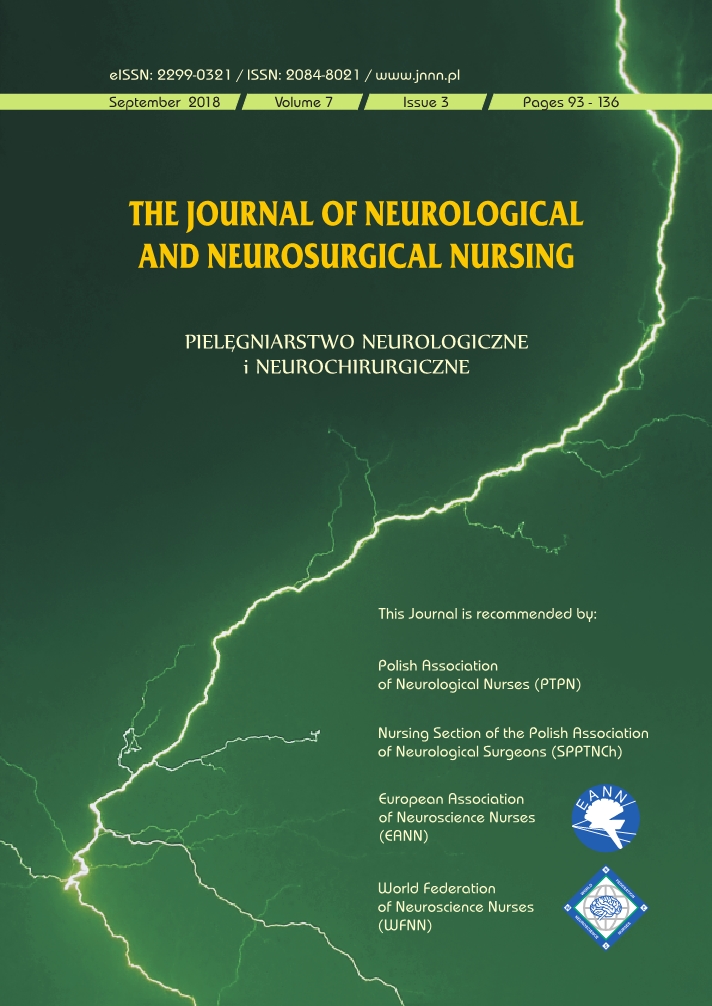Niepokój i lęk pacjentów związany z planowanym zabiegiem operacyjnym w neurochirurgii
DOI:
https://doi.org/10.15225/PNN.2018.7.3.2Słowa kluczowe
niepokój, lęk, pacjent, zabieg operacyjnyAbstrakt
Wstęp. Leczenie operacyjne dla pacjenta jest sytuacją bardzo trudną, związaną z odczuwaniem niepokoju i lęku. Lęk w okresie przedoperacyjnym może być związany z przebiegiem planowanej operacji, ryzykiem pojawienia się powikłań pooperacyjnych, czy z rozpoznaniem histopatologicznym w przypadku nowotworów.
Cel. Celem pracy było zbadanie czy pacjenci oczekujący na zabieg neurochirurgiczny odczuwają niepokój i lęk związany z leczeniem oraz jak oceniają poziom lęku u siebie.
Materiał i metody. Badaniami objęto 102 pacjentów dorosłych, zakwalifikowanych do leczenia operacyjnego w Klinice Neurochirurgii 10 Wojskowego Szpitala Klinicznego z Polikliniką SP ZOZ w Bydgoszczy. Badania zostały przeprowadzone w okresie od 25.04.2017 r. do 30.06.2017 r. w wyżej wymienionej Klinice, na które uzyskano zgodę Komisji Bioetycznej przy Collegium Medicum im. L. Rydygiera w Bydgoszczy UMK w Toruniu (KB 341/2017). Metodą badawczą był sondaż diagnostyczny, natomiast narzędziem wykorzystanym do oceny pacjentów była autorska ankieta zawierająca metyczkę oraz pytania zasadnicze związane z tematem pracy.
Wyniki. Ponad połowa badanych odczuwała niepokój w związku z planowanym leczeniem: 31,4% wskazało odpowiedz „tak”, 21,6% „raczej tak”. Blisko 65% badanych nie miało obaw w związku ze swoim staniem zdrowia: „raczej nie” 34,3%, „nie” 30,4%. 66,7% respondentom towarzyszyło na co dzień poczucie lęku. Oceniając lęk przedoperacyjny ponad 50% pacjentów oceniło u siebie lęk na poziomie od 1 do 3 w skali 10-stopniowej. Wykazano zależność odczuwania niepokoju względem wieku (p≤0,05). Ponadto poziom odczuwanego lęku był wyższy u chorych nie obciążonych innymi schorzeniami (p≤0,05).
Wnioski. Większość pacjentów neurochirurgicznych odczuwała niepokój w okresie przedoperacyjnym, ponad połowa badanych oceniła swój lęk na poziomie niskim. Wiek pacjentów okazał się czynnikiem mającym wpływ na poziom odczuwanego niepokoju. Pacjenci starsi częściej odczuwali niepokój niż pacjenci młodsi. Wyższy poziom doczuwanego lęku wykazano u chorych nie obciążonych innymi schorzeniami. (PNN 2018;7(3):104–110)
Bibliografia
Niechwiadowicz-Czapka T. Rola i zadania pielęgniarki w zakresie przygotowania psychicznego pacjenta do operacji. Puls Uczelni. 2014;8(2):36–44.
Niechwiadowicz-Czapka T. Wybrane zagadnienia opieki pielęgniarskiej w aspekcie przygotowania psychicznego pacjenta do zabiegu chirurgicznego. Piel Zdr Publ. 2014;4(2):155–159.
Śniecikowska B. Czynniki generujące poziom lęku w okresie okołooperacyjnym u pacjentek zakwalifikowanych do operacji w obrębie gruczołu tarczowego. Probl Pielęg. 2013;21(2):228–234.
Turbiarz A., Babiarczyk B. Obawy pacjentów operowanych w systemie chirurgii jednego dnia — przegląd literatury. Probl Pielęg. 2015;23(2):265–268.
Augustyniuk K., Pawlak J., Jurczak A. et al. Ocena poziomu lęku u pacjentów hospitalizowanych. Fam Med Primary Care Rev. 2013;15(2):73–75.
Grzelak L., Wiszniewska M. Wybrane zagadnienia kliniczne chorób układu nerwowego leczonych operacyjnie. W: Jabłońska R., Ślusarz R. (Red.), Wybrane problemy pielęgnacyjne pacjentów w schorzeniach układu nerwowego. Wyd. Continuo, Wrocław 2012;133–146.
Nagańska E., Dyttus-Cebulok K. Neuroonkologia. W: Fiszer U., Michałowska M. (Red.), Podstawy neurologii z opisami przypadków klinicznych. Wyd. Termedia, Poznań 2010;193–220.
Ręcławowicz D., Stempniewicz M., Biernat W., Słoniewski P. Nowe spojrzenie na klasyfikację i terapię nowotworów glejowych II stopnia złośliwości wg WHO — przegląd piśmiennictwa. Neurol Neuroch Pol. 2008;42(6):536–545.
Jabłońska R., Swincow A. Stan emocjonalny chorych leczonych operacyjnie z powodu dyskopatii kręgosłupa. Pielęg Neurol Neurochir. 2012;1(3):103–108.
Turkiewicz-Maligranda A., Rymaszewska J. Lęk i depresja a odczuwany ból u osób z chorobą dyskową odcinka krzyżowo-lędźwiowego charakteryzujących się różnym stylem przywiązania. Piel Zdr Publ. 2012;2(4):277–286.
Ziębicka J., Gajdosz R. Wybrane aspekty lęku u chorych oczekujących na operację. Anest Intens Ter. 2006;1:41–44.
Bernad D., Stolińska A., Szukała E., Szeremiota A. Wpływ personelu medycznego na obniżenie poziomu lęku u pacjentów leczonych chirurgicznie w okresie przedoperacyjnym na Oddziale Chirurgii Głowy i Szyi i Onkologii Laryngologicznej. W: Pasek M., Dębska G. (Red.), Interdyscyplinarna opieka nad pacjentem z chorobą nowotworową. Wyd. Krakowska Akademia im. Andrzeja Frycza Modrzejewskiego, Kraków 2010;93–101.
Motyka M., Kamińska M., Kochman M. Stres przed zabiegiem operacyjnym a przebieg okresu pooperacyjnego u pacjentów po wszczepieniu endoprotezy stawu biodrowego. Prz Lek. 2016;73(1):25–28.
Lewicka M., Makara-Studzińska M., Wdowiak A., Sulima M., Kanadys K., Wiktor H. Poziom lęku i depresji w okresie okołooperacyjnym a kategoria zabiegu operacyjnego w grupie kobiet leczonych z powodów ginekologicznych. MONZ. 2012;18(2):107–111.
Jermołaj A., Halicka M. Hospitalizacja jako czynnik stresujący pacjentów w starszym wieku. W: Krajewska-Kułak E., Sierakowska M., Lewko J., Łukaszuk C. (Red.), Pacjent podmiotem troski zespołu terapeutycznego. Tom 1. Wyd. Akademia Medyczna w Białymstoku, Wydział Pielęgniarstwa i Ochrony Zdrowia, Białystok 2005;211–219.
D’Angelo C., Mirijello A., Leggio L. et al. State and trait anxiety and depression in patients with primary brain tumors before and after surgery: 1-year longitudinal study. J Neurosurg. 2008;108(2):281–286.
Mainio A., Hakko H., Niemelä A., Tuurinkoski T., Koivukangas J., Räsänen P. The effect of brain tumour laterality on anxiety levels among neurosurgical patients. J Neurol Neurosurg Psychiatry. 2003;74(9):1278–1282.
Pobrania
Opublikowane
Jak cytować
Numer
Dział
Licencja

Utwór dostępny jest na licencji Creative Commons Uznanie autorstwa – Bez utworów zależnych 4.0 Międzynarodowe.
Statystyki
Liczba wyświetleń i pobrań: 403
Liczba cytowań: 0
